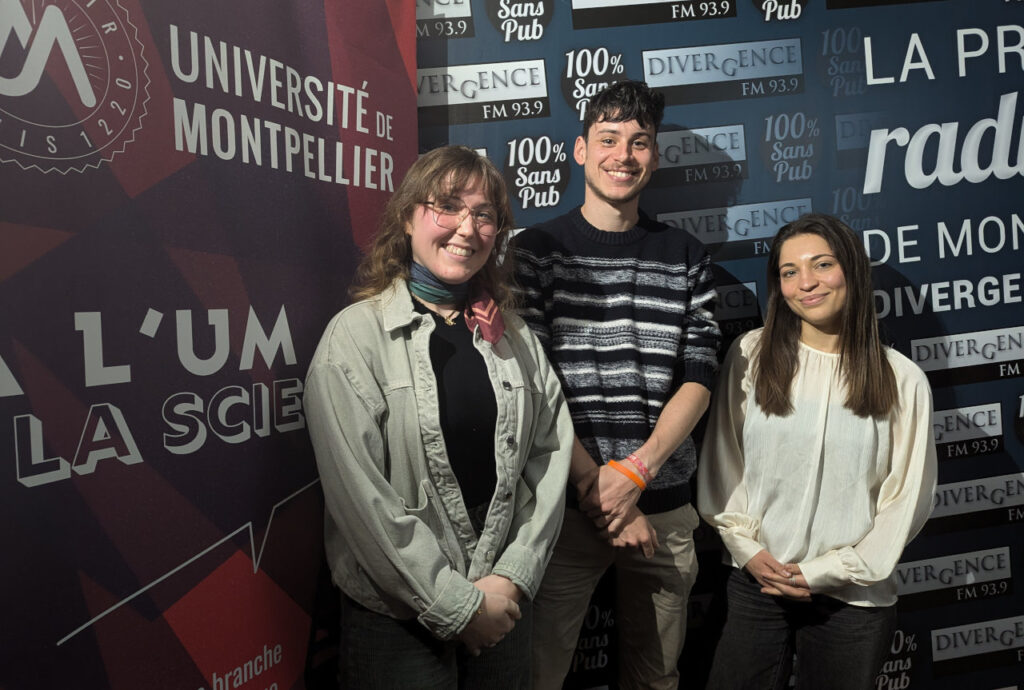Science at UM [S04-ep23]: Three years of thesis work summarized in three minutes
This week in A l’UM la science, doctoral students Jérémy Defrance from the Center for Functional and Evolutionary Ecology (Cefe), Klara Asselin from the Infectious Diseases and Vectors: Ecology, Genetics, Evolution, and Control Laboratory (Mivegec) and Sandra Victor from the Montpellier Laboratory of Computer Science, Robotics and Microelectronics (Lirmm) talk to us at length about the My Thesis in 180 Seconds competition, of which they are the proud winners. The program is broadcast every Wednesday on Divergence.

In 2024, approximately 64,000 students were enrolled in doctoral programs. Forty-two percent of them had parents who were executives or intellectual professionals, 3.6% came from working-class backgrounds, and only 1.3% were children of farmers. This situation has changed very little since Pierre Bourdieu first studied the issue in the 1960s. The reasons for this are, of course, social reproduction, which leads to selection based on social, economic, and intellectual capital, but also perhaps a lack of understanding among the general public of what a thesis is and what research is more generally.
To democratize and popularize this ultimate academic exercise, several initiatives have emerged, including Ma thèse en 180 secondes(My thesis in 180 seconds). Inspired by Three Minute Thesis, which was conceived in Australia in 2008, the French-language version of this scientific competition was launched in Quebec in 2012 before arriving in France in 2014. The principle is simple: as the name suggests, participants have three minutes to present their thesis using a single slide and in front of a non-specialist audience. Humor plays a big part, as do references to popular culture.
In 2020, Deborah Faucon, an expert in titanium used to make aircraft doors, won the Occitanie regional final with her "Welcome aboard flight MT 180." Before her, Yassin Tachikart, a doctoral student in biology and pharmacy, compared senescent cells to "that neighbor who turns up the music at 4 a.m. and wakes up the whole building." In 2021, Mathilde Guérin charmed the audience with a performance straight out of an Asterix album, in which the druid Pronostix saved his patient "from the bacteria trying to invade the village of Open-Wound-That-Hurts."
This year, it was the song of a chickadee that charmed the audience and jury of MT 180. Behind this song is Jérémy Defrance, a doctoral student at Cefe, the Center for Functional and Evolutionary Ecology. He is interested in the role of resources in the reproduction of great tits in urban and forest environments.
Watch Jérémy Defrance's presentation
The jury awarded second place to Klara Asselin from the Mivegec laboratory for Infectious Diseases and Vector Ecology, Genetics, Evolution, and Control. She is interested in the impact of sexual reproduction on the vertical transmission of cancers.
Watch Klara Asselin's presentation
Sandra Victor from the Montpellier Laboratory of Computer Science, Robotics and Microelectronics (LIRMM) takes third place with a presentation on modeling hybrid behaviors during interactions with intelligent automated agents, in this case an autonomous car.
Watch Sandra Victor's presentation
At UM Science, you have the program, so let's get started!
Co-production: Divergence FM / University of Montpellier
Host: Lucie Lecherbonnier
Interview: Lucie Lecherbonnier / Aline Périault
Production: Alice Rollet
Listen to the program “A l’UM la science” on Divergence FM 93.9

Find UM podcasts now available on your favorite platform (Spotify, Deezer, Apple Podcasts, Amazon Music, etc.).